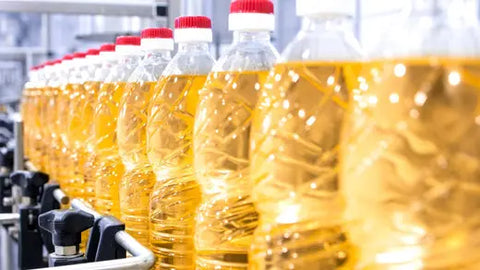Seed and vegetable oils, often touted as “healthy” alternatives to animal fats, have infiltrated modern diets, replacing traditional sources of dietary fat like butter, lard, and tallow. However, emerging research reveals these oils may be detrimental to our health. This article explores what these oils are, how they are made, when humans started using them, and why they may pose significant risks to our well-being, referencing insights from renowned sports and nutrition expert Dr Paul Mason.
What Are Seed and Vegetable Oils?
Seed and vegetable oils are extracted from plants such as soybeans, corn, sunflower seeds, and canola. Despite their “vegetable” branding, they’re primarily industrial products derived from seeds, nuts, and legumes. Common examples include canola oil, sunflower oil, soybean oil, and corn oil. These oils are rich in omega-6 polyunsaturated fatty acids (PUFAs), a type of fat often marketed as heart-healthy due to their cholesterol-lowering properties.
How Are They Made?
The production of seed and vegetable oils involves extensive industrial processing. Seeds are crushed to extract the oil, which is then refined using high heat and chemical solvents like hexane to maximise yield. These oils are often deodorised and bleached to improve their smell, taste, and appearance. The result is a highly refined product far removed from its natural state.
When Did Humans Start Using Seed Oils?
Human consumption of seed and vegetable oils began in the early 20th century, coinciding with the Industrial Revolution and the rise of modern agriculture. Before this, dietary fats came from whole foods like butter, lard, and coconut oil. Procter & Gamble introduced Crisco—a hydrogenated vegetable oil—in 1911, marking the beginning of widespread seed oil use. Their affordability and long shelf life made them a staple in processed foods, leading to their dominance in modern diets.
Hydrogenated Seed Oils and Trans Fats
Hydrogenated seed oils, also known as partially hydrogenated oils, are created through a chemical process that adds hydrogen to liquid oils, converting them into a semi-solid form. This process produces trans fats, which are widely recognised as some of the most harmful dietary fats. According to research, excessive consumption of partially hydrogenated oils is associated with systemic inflammation, insulin resistance, and an elevated risk of type 2 diabetes and stroke. The FDA has banned trans fats in many countries, yet they remain present in some ultra-processed foods.
Why Are Seed and Vegetable Oils Harmful Even When Not Heated?
Dr Paul Mason, a leading authority on medical nutrition therapy, highlights three main reasons seed and vegetable oils are harmful:
High Omega-6 Content
Seed oils are rich in omega-6 fatty acids, which can disrupt the omega-6 to omega-3 balance essential for optimal health. Dr Mason explains that while omega-6 fats are essential, excessive consumption can promote inflammation. He notes, “Omega-6 fats are not inherently inflammatory, but when combined with inflammatory triggers, they can exacerbate the problem.” Modern diets, dominated by processed foods, are disproportionately high in omega-6, leading to a host of inflammatory conditions. However, Dr Mason doesn’t consider omega 6 the main issue.
Oxidation and Free Radicals
The polyunsaturated bonds in seed oils make them highly unstable. During processing and cooking, these oils oxidise, producing harmful compounds known as lipid peroxides. Dr Mason points out that consuming oxidised seed oils introduces these toxic byproducts into the bloodstream, where they can persist for hours or even days, especially in individuals with metabolic dysfunction such as diabetes. This can result in health issues such as increased oxidative stress, inflammation, heart disease, metabolic dysfunction, liver damage, neurodegenerative diseases, reduced longevity of red blood cells, and exacerbated complications in diabetes.
Phytosterols (Plant Cholesterol Analogues)
Seed oils contain plant cholesterol analogues called phytosterols, which Dr Mason identifies as a critical contributor to their toxicity. These compounds are absorbed by human cells but do not function as normal cholesterol, leading to structural and functional damage. Phytosterols have even been found embedded in atherosclerotic plaques, contributing to heart disease.
Health Risks Associated with Seed Oils
-
Cardiovascular Disease
Studies like the Sydney Diet Heart Study and the Minnesota Coronary Experiment found that replacing saturated fats with seed oils increased mortality rates despite lowering cholesterol levels.
-
Metabolic Dysfunction
Dr Mason highlights the role of seed oils in promoting insulin resistance, a key driver of metabolic syndrome and type 2 diabetes. Their oxidative byproducts and phytosterols interfere with cellular processes, impairing insulin signalling.
-
Chronic Inflammation
Excessive omega-6 intake from seed oils contributes to a pro-inflammatory state linked to conditions like arthritis, autoimmune diseases, and even depression. However, Dr Mason points out that omega-6 content is not a key reason seed oils are harmful.
-
Reduced Longevity
Dr Mason notes that long-term consumption of seed oils correlates with reduced lifespan in several large-scale studies.
Issues Related to Reheating Seed Oils
Reheating seed oils, particularly at high temperatures, exacerbates their toxicity. Studies reveal that heating seed oils produces significant amounts of trans fats, as well as harmful oxidation products like aldehydes and acrylamides, which are linked to cancer and neurodegenerative diseases. Repeatedly using oils for deep frying, as often occurs in restaurants, creates a cocktail of toxic compounds that increase oxidative stress and inflammation. Animal studies have shown that heated seed oils can lead to liver damage, lipid profile deterioration, and oxidative stress markers. Repeated exposure to these reheated oils has been linked to metabolic dysfunction, insulin resistance, and an increased risk of cardiovascular diseases.
Breaking the Myths Around Seed Oils
Seed oils gained popularity largely due to their ability to lower LDL cholesterol, often dubbed “bad cholesterol.” However, Dr Mason warns that this focus on cholesterol is misleading. He explains, “While seed oils may lower LDL, they do so at the cost of increasing oxidative stress and cellular damage, ultimately leading to worse health outcomes.”
Alternatives to Seed Oils
To reduce the health risks associated with seed oils, consider returning to traditional fats that humans have consumed for millennia:
-
Butter
Rich in fat-soluble vitamins and healthy saturated fats.
-
Tallow and Lard
Rendered animal fats ideal for cooking at high temperatures.
-
Coconut Oil
Stable and rich in medium-chain triglycerides (MCTs).
-
Olive Oil
A heart-healthy monounsaturated fat best used raw or for low-temperature cooking.
-
Avocado Oil
Another monounsaturated fat suitable for cooking.
Practical Tips for Avoiding Seed Oils
-
Read Labels
Many processed foods contain seed oils, even those marketed as “healthy.” Check ingredient lists for terms like “vegetable oil” or specific seed oil names. Most ultra-processed and packaged foods contain seed oils even when marketed as healthy. At Chief, we never use seed oils! Check out our Beef Bars, Collagen Bars and Biltong to find the perfect snack for you.
We encourage you to become pack flippers and teach you How To Read Food Labels.
-
Cook at Home
Preparing meals from scratch gives you control over the fats you use. Most restaurants use canola oil to fry and deep fry. Ask to cook your meals in butter.
-
Choose Whole Foods
Stick to unprocessed, nutrient-dense foods that don’t require added oils.
Seed and vegetable oils are a modern dietary addition with significant health risks, from promoting inflammation and oxidative stress to contributing to chronic diseases and reduced longevity. As Dr Paul Mason aptly summarises, “The closer we return to natural, unprocessed foods, the better our health will be.” We can take a significant step towards better health and longevity by replacing seed oils with traditional fats and prioritising a whole-food diet.”

References
- Ramsden, C. E., et al. (2013). Re-evaluation of the traditional diet-heart hypothesis: analysis of recovered data from the Sydney Diet Heart Study. BMJ Open.
- Frantz, I. D., et al. (1989). The Minnesota Coronary Experiment. The Lancet.
- Mason, P. (2023). Lecture on seed oils and metabolic health. Low Carb Down Under.
- Mozaffarian, D., & Wu, J. H. (2011). Omega-3 fatty acids and cardiovascular disease. Journal of the American College of Cardiology.
- Excessive intake of seed oils and chronic disease (2023). https://www.ncbi.nlm.nih.gov/pmc/articles/PMC10386285/
- Partially hydrogenated vegetable oils. https://pubmed.ncbi.nlm.nih.gov/18842776/
- Heating seed/vegetable oils to high temperatures for prolonged times causes formation of transfats. https://www.ncbi.nlm.nih.gov/pmc/articles/PMC9002916/
- Soy vs Coconut oil. https://bmcgenomics.biomedcentral.com/articles/10.1186/s12864-018-5202-z
- Heated seed oils (study on hamsters). https://www.mdpi.com/2076-3921/11/9/1732
- Deep fried seed oils. https://pubmed.ncbi.nlm.nih.gov/38898335/
- Fried soybean oil. https://pubmed.ncbi.nlm.nih.gov/38930592/
- Possible adverse effects of frying with vegetable oils. https://www.cambridge.org/core/journals/british-journal-of-nutrition/article/possible-adverse-effects-of-frying-with-vegetable-oils/BAFA919B036723C095287BE003AA5A3A




Comments (0)
There are no comments for this article. Be the first one to leave a message!